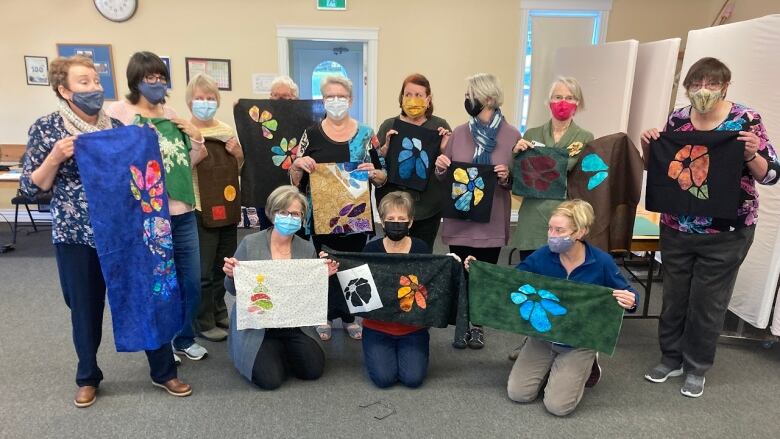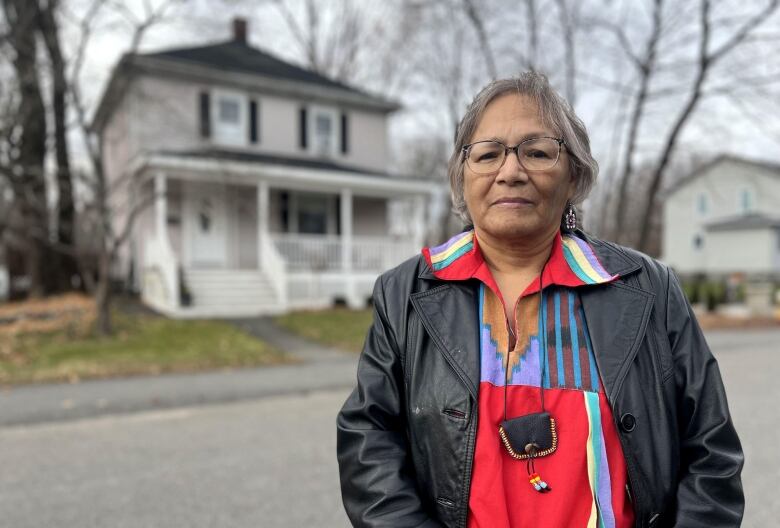With each stitch, a quilting guild reaches out to residential school survivors
Debbie Paul says quilt made by New Brunswick group a 'wonderful' gesture

A four-decade-old quilting guild in New Brunswick has joined forces with a newly established non-profit called Quilts for Survivorsin an effort to show solidarity and compassion for residential school survivors in the Maritimes.
"We would just like these folks to, to see this blanket as a gesture of respect, caring, that we hear them, that we see them, that we acknowledge their pain, and support them on their journey, whatever it may be," said Libby Maskos, president of Kennebecasis Valley Quilting Guild in Quispamsis, a suburb of Saint John.
Maskos said each quilt takes around eight metres of fabric and she and the quilting guild,which currently consistsof 120 members,make the quilts piece by piece during Zoom"quilting sessions"where they all gather virtually to talk and sew.
Since September, they've made three quilts to be given to survivors, including one for Debbie Paul, a Mi'kmaw woman who was forced to attend Shubenacadie Indian Residential School in Nova Scotia during the 1960sand was later kidnapped by a nun and brought up by a white family in Rockland, Mass.
Maskos said after she saw Paul's story on CBC she just knew she had to show her how touched she and the group were by her story.
"It moved us beyond beyond, beyond, beyond [belief], and we said she is a person we would love to give a quilt to."

Maskosreached out toVanessa Genier, awoman from Missanabie Cree First Nation who has been making quilts for survivors of residential schools since 2021 and is the originator of the group Quilts for Survivors. Through Genier,Maskoswas able to connect withPaul.
"I've spoken to her, we're so excited to meet her,"Maskos said.
Paul said she's thankful Maskos and the guild thought of her and plans to make the trek from Halifax to New Brunswick to retrieve her quilt in person once pandemic restrictions ease.
"'Thank you'doesn't seem like enough, those are the words, but it doesn't feel like it's enough to show my gratitude," said Paul.
"What these people done for me, they didn't have to. There's a lot of good people, and it's wonderful."
Paul said she plans to give her quilt to Mary Rome, now Mary Shanklin, a neighbour in Rocklandwhile Paul lived thereand someone who treated her with kindness.
"Love, respect, dignity, you know, and that's what I felt from her and I love her," Paul said.
Paul survived the residential school but later became part of the Sixties Scoop, the practice of adopting or fostering Indigenous kids to white families, which is how she came to meet Shanklin.
Paul saidShanklin, now 93, was one of the few people she met during those times who didn't discriminate against her.
Maskos said their collaboration with Genier will come to an end in June and without her, it may prove difficult to find survivors within the Maritime provinces due to privacy issues and fears of unearthing trauma.
However,the group has a goal to make at least 50 quilts for survivors in the Maritime provinces over the next two years.
"We want to be able to wrap them in a little bit of love and respect and caring and know that we're out there, and of course, as quilters we believe a quilt will fix everything, or at least make it better."













_(720p).jpg)


 OFFICIAL HD MUSIC VIDEO.jpg)
.jpg)



























































































